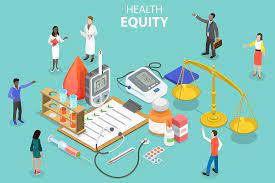November 1, 2022
The Community Health Corner
Submitted by Stephanie Gutierrez

Community health uses science-based approaches for the greatest health benefit to the greatest number of people by addressing the social, economic and structural drivers that impact everyone’s health. The National Extension Framework for Health Equity and Well-being recommends using community development practices to ensure that every person has the opportunity to "attain his or her full health potential" and no one is "disadvantaged from achieving this potential because of social position or other socially determined circumstances." The following tools and resources can be used to improve health equity and well-being by working with communities to achieve the nation’s Healthy People 2030 objectives.
READ NOW: Trust for America’s Health’s (TFAH) 19th annual report on the nation’s obesity crisis found that 19 states have obesity rates over 35 percent, up from 16 states in 2021, and that social and economic factors are key drivers of increasing obesity rates. The report includes data by race, age and state of residence and recommendations for policy action. Read the full report here.
USE NOW: On March 1, 2018, Trust for America’s Health, with support from The California Endowment, held a convening Advancing Health Equity: What We Have Learned from Community-based Health Equity Initiatives in Oakland, California to identify and examine promising practices from existing initiatives. The resulting convening summary outlines core strategies of successful community-based health equity initiatives and recommendations for next steps in creating and advancing a policy agenda to promote community-based health equity initiatives.
REGISTER NOW: For the Kansas Tobacco Cessation Help Online Training. Providers, Community Health Workers and other professionals can access the Kansas Tobacco Cessation Help (KaTCH) free self-directed training. It is structured into seven learning modules, each ranging from 15 to 30 minutes. Modules include information on Kansas Tobacco Quitline benefits and programs, tobacco use and chronic conditions, and Quitline counseling call samples. To access the resource, click here.
For more information, contact Elaine Johannes, ejohanne@ksu.edu; and Stephanie Gutierrez, smgutier@k-state.edu.